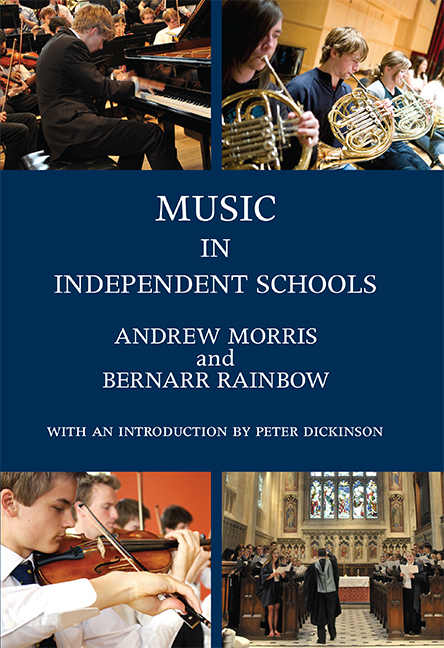Book contents
- Frontmatter
- Contents
- List of Plates
- General Editor's Foreword
- Editor's Introduction
- Biographical Notes
- List of Abbreviations
- PART I Studies from Music and the English Public School (1990)
- PART II The New Millennium
- SOME INDEPENDENT SCHOOLS IN THE NEW MILLENNIUM
- 1 Bedford
- 2 Dulwich
- 3 Eton
- 4 Gresham's
- 5 St Paul's
- 6 Uppingham
- 7 Worksop
- FURTHER TRADITIONS
- ORGANISATIONS
- Index
- Appendix
6 - Uppingham
from SOME INDEPENDENT SCHOOLS IN THE NEW MILLENNIUM
Published online by Cambridge University Press: 05 October 2014
- Frontmatter
- Contents
- List of Plates
- General Editor's Foreword
- Editor's Introduction
- Biographical Notes
- List of Abbreviations
- PART I Studies from Music and the English Public School (1990)
- PART II The New Millennium
- SOME INDEPENDENT SCHOOLS IN THE NEW MILLENNIUM
- 1 Bedford
- 2 Dulwich
- 3 Eton
- 4 Gresham's
- 5 St Paul's
- 6 Uppingham
- 7 Worksop
- FURTHER TRADITIONS
- ORGANISATIONS
- Index
- Appendix
Summary
Uppingham School began the second half of the twentieth century blessed with a fine musical legacy. Eighty years of sustained endeavour by two remarkable men, Paul David (for forty-three years) and Robert Sterndale Bennett (for thirty-seven years), gave Douglas Guest a firm foundation on which to build in his five dynamic years at Uppingham before he left to go to Salisbury Cathedral as Organist and Master of the Choristers in 1950. Among Guest's innovations were the establishment of music scholarships and the founding of the Paul David Society and of the Uppingham and District Concert Club. In addition, he appointed the school's first band master, John Allen. He introduced performances of Bach's great choral works and staged a production of Purcell's The Faery Queen, which was favourably reviewed in The Times.
All three men had been supported by headmasters who believed that music is important and makes a unique and valuable contribution to the education of the young. This established principle continued to develop in the gradually changing social and artistic environment of the next fifty years. It was not necessarily a steady progress, but it was progress nevertheless.
In the 1950s and 1960s, resources, time and many inspired teachers encouraged the playing of a wide range of chamber music. This was stimulated by the annual Henry Ley Cup competitions, which were organised ostensibly on a house basis in which ensemble players were matched according to ability.
- Type
- Chapter
- Information
- Music in Independent Schools , pp. 287 - 291Publisher: Boydell & BrewerPrint publication year: 2014

